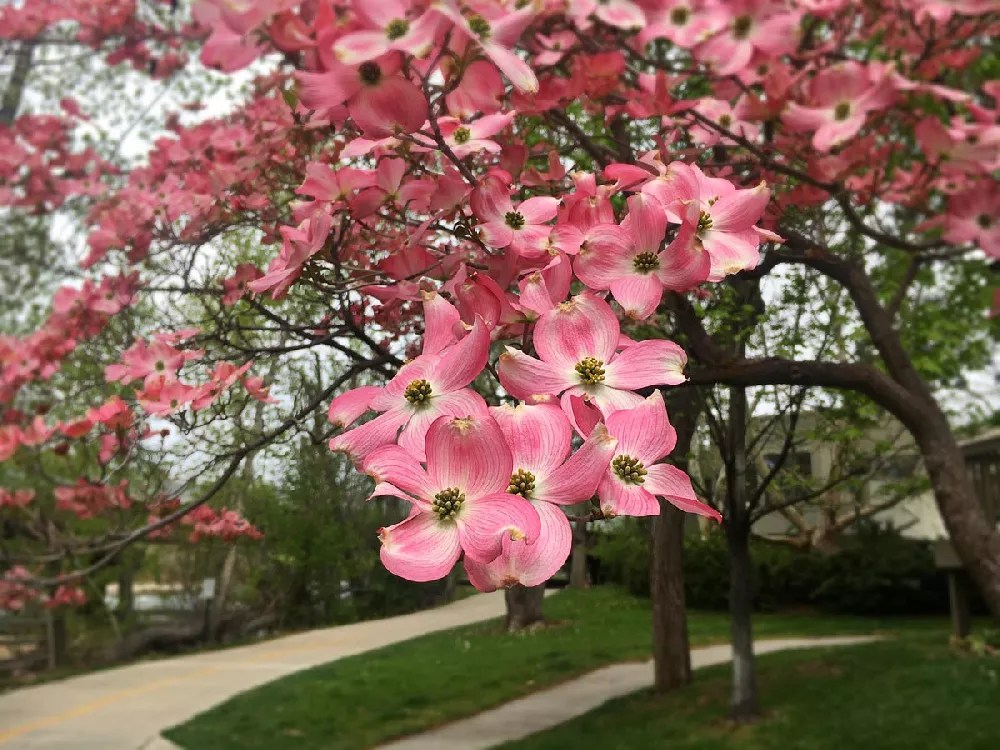Milky Way Chinese Dogwood Tree for Sale - Buying & Growing Guide
The Milky Way Chinese Dogwood Tree, Cornus kousa var. Chinensis 'Milky Way,' is a spectacular cultivar that has the beauty and grace of all dogwoods but with resistance to the diseases that are common with these popular trees. It's a compact tree with a silhouette that is vase-shaped when the tree is young but matures to an attractive rounded form with low-horizontal branches that provide interest in the winter garden. The spring flowers—technically bracts—are lovely: snowy white with a center of yellow-green. These transform in the summer into large reddish berries that are beloved by songbirds and other animals. In fall, the leaves turn orange and red and offer another show in your garden. They are easy to grow and are a reliable splash of color in any garden. Here are a few more reasons to add one or more to yours:
- Generally pest-free, with few insect enemies.
- Deer resistant.
- Excellent in woodland or Asian-inspired gardens.
Enter your zip code to find nearby stores that may carry this plant.
Plant Care
Sunlight

The Milky Way Chinese Dogwood thrives in partial sun—about four hours of direct sunlight a day.
Watering
Water once a week, or whenever the soil two inches below the surface is dry.
Fertilizing

Fertilize lightly in spring with a half-strength application of a general-purpose, slow-release fertilizer.
Planting and Care
Planting instructions
Site your dogwood where it will get partial sun each day, in fertile soil that drains well. If you are in the north, it can handle full sun; southern gardeners should choose a spot with dappled shade or morning sun and afternoon shade. Unpot the tree and tease out any encircling roots, which can girdle it and slowly kill it. Dig a hole that’s as deep as the root ball and three times as wide. Place the tree in the hole, spreading out the roots. Holding it upright and steady, fill in around it with topsoil mixed with compost or well-rotted manure. Water thoroughly. Apply a two to three-inch layer of organic mulch such as bark chips around the root zone to conserve moisture and hinder weed growth but keep it from touching the bark, which can promote rot.
Watering and nutrients
Water your Milky Way Dogwood about once a week, giving it an inch of water each time. If the leaves turn light green during the growing season, you may be overwatering; drooping leaves may be a sign of over or underwatering. The Milky Way Dogwood is a light feeder and needs only a sparing application of a general-purpose, slow-release fertilizer designed for landscape trees and shrubs in early spring.
Pollination
Milky Way Dogwoods are monoecious, or self-fertile, and a single tree has both male and female reproductive organs. That means you only need one tree for your Milky Way Dogwood to bear fruit. The fruiting body of this tree is small and berry-like, and although it is technically edible by people, it is most often left for the birds, which will flock to your tree when it’s covered in bright red berries.
Pruning
The Milky Way Dogwood needs only light pruning to remove dead, diseased or damaged branches. If the tree produces suckers at the base of the trunk, these can also be cut out, as well as any low, horizontal branches that interfere with foot traffic or lawn mower use.
Pests, diseases, and animals
The Milky Way Dogwood is resistant to many dogwood diseases and pests, including anthracnose — a common problem with some dogwoods. Pests that may appear include borers, leaf miners and scale insects. A healthy tree should be able to fend off infestations with little help. Although diseases are unusual on these trees, they will rarely show signs of dogwood canker, botrytis and powdery mildew. A copper fungicide may help with these diseases, which are all fungal in nature.
Achieving maximum results
Properly preparing your soil for your Milky Way Chinese Dogwood is one way to achieve maximum results. Consider doing a soil test before you plant. These trees prefer soil that is neutral to somewhat acidic, and a simple soil test kit will tell you everything you need to know to give it a good head start. These can be purchased online or in your local garden center. Dogwoods also appreciate soil that is high in organic material, and they will thank you for an annual dressing of the root zone in well-rotted compost or manure.
FAQs
Where can I grow the Milky Way Chinese Dogwood?
The Milky Way Dogwood grows well throughout much of the U.S. It is hardy in USDA hardiness zones four through eight, which means it can handle temperatures as low as -20 degrees Fahrenheit. You can successfully grow this cultivar in all but the most northern parts of New England and the Midwest, and as far south as northern Florida and most of Texas.
How much space does the Milky Way Dogwood take up?
The mature height of a Milky Way Chinese Dogwood tree is 15 to 20 feet — so you may want to avoid planting it under any low-hanging overhead utility cables or wiring. The mature tree's width can also reach 15 to 20 feet, so plant it far enough away from buildings and sidewalks to allow for steady growth without hindering foot traffic.
How is this tree best used in my landscape?
The Milky Way Dogwood makes an excellent specimen tree — imagine one or a grouping of three or five gracing a front lawn, underplanted with astilbes or other shade-loving perennials in a gravel bed. It makes a good addition to foundation plantings, as long as you leave enough room between the tree and any buildings. It's a natural fit for Asian-themed gardens, cottage gardens and woodland settings.
Compare Similar Products
You can't add more Product Name - Product size to the cart.
OK








